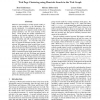Free Online Productivity Tools
i2Speak
i2Symbol
i2OCR
iTex2Img
iWeb2Print
iWeb2Shot
i2Type
iPdf2Split
iPdf2Merge
i2Bopomofo
i2Arabic
i2Style
i2Image
i2PDF
iLatex2Rtf
Sci2ools
IJCAI
2007
2007
Web Page Clustering Using Heuristic Search in the Web Graph
Effective representation of Web search results remains an open problem in the Information Retrieval community. For ambiguous queries, a traditional approach is to organize search results into groups (clusters), one for each meaning of the query. These groups are usually constructed according to the topical similarity of the retrieved documents, but it is possible for documents to be totally dissimilar and still correspond to the same meaning of the query. To overcome this problem, we exploit the thematic locality of the Web— relevant Web pages are often located close to each other in the Web graph of hyperlinks. We estimate the level of relevance between each pair of retrieved pages by the length of a path between them. The path is constructed using multi-agent beam search: each agent starts with one Web page and attempts to meet as many other agents as possible with some bounded resources. We test the system on two types of queries: ambiguous English words and people names. The Web...
Ambiguous Queries | Artificial Intelligence | IJCAI 2007 | Information Retrieval Community | Web Page |
Related Content
| Added | 29 Oct 2010 |
| Updated | 29 Oct 2010 |
| Type | Conference |
| Year | 2007 |
| Where | IJCAI |
| Authors | Ron Bekkerman, Shlomo Zilberstein, James Allan |
Comments (0)

